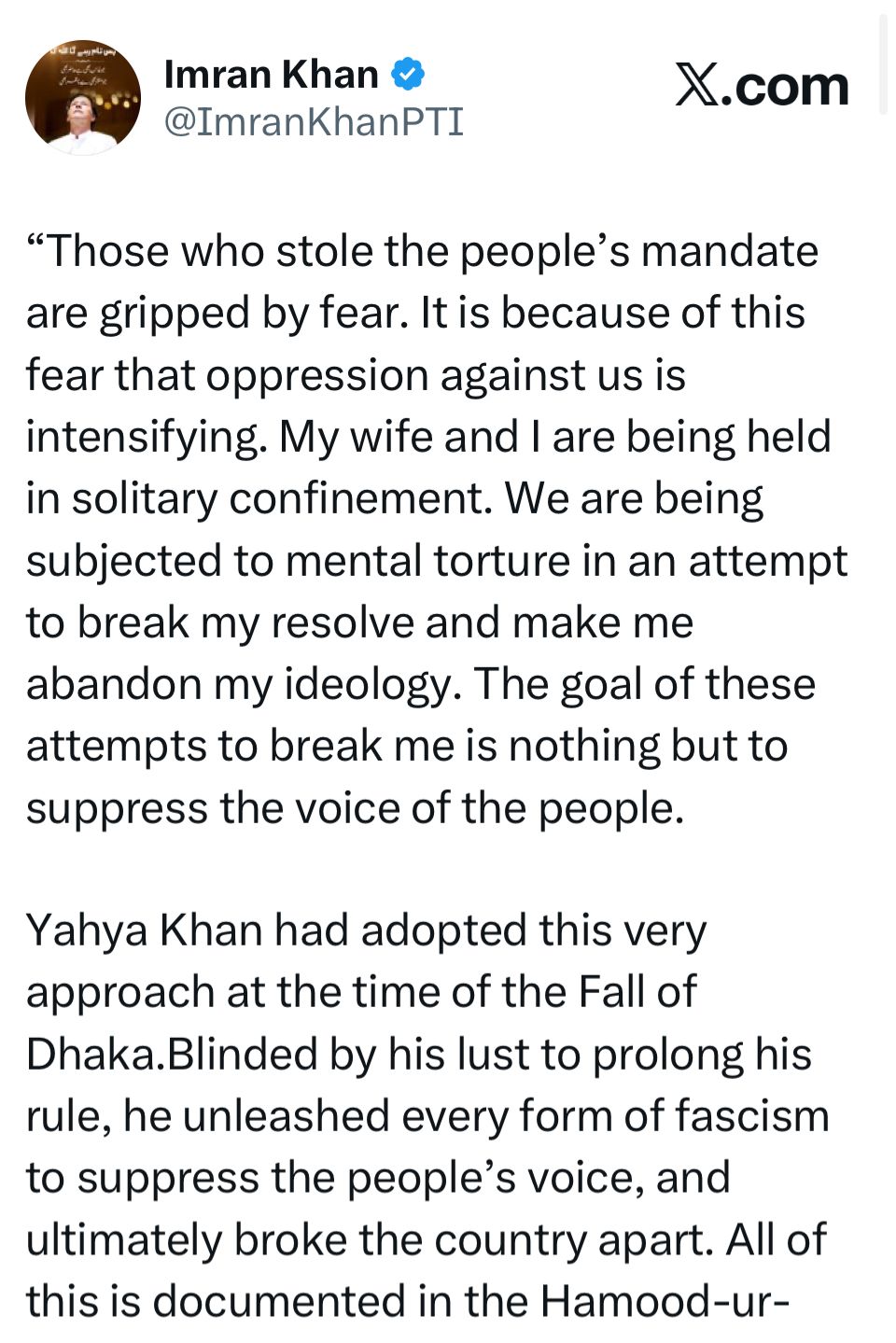DND Report
Former Prime Minister Imran Khan, infamous for repeatedly attacking the statehood of Pakistan, once again used his X handle to suggest that Pakistan should face a situation similar to 1971, when the country lost its eastern wing—what is now Bangladesh.
On May 26, 2024, Khan shared a propaganda video on X in which he drew parallels between himself and Sheikh Mujibur Rahman, the founder of Bangladesh. In his speeches and social media posts, he has often expressed the desire to see Pakistan fail, repeatedly comparing today’s Pakistan to the events that led to Bangladesh’s independence.
Under his instructions, his followers in Europe and North America burned Pakistani passports and flags, and were told to write letters to the United Nations alleging large-scale human rights violations in Pakistan, urging the world body to penalize the country. He also directed his party to send a letter to the IMF demanding that loans to Pakistan be stopped, so that the country would be pushed toward bankruptcy.
Recently, there has been a surge in derogatory and provocative posts from official PTI X accounts. A particularly disturbing example was a comparison between Sheikh Mujibur Rahman and the Pakistan Army. These posts target senior political and military leadership with baseless accusations and vile rhetoric. This fresh tirade, directly linked to Khan’s instructions, serves two purposes: first, to provoke political and military leaders into banning his party; and second, to strengthen PTI’s victimhood narrative of “No Khan – No Party.”
Several questions arise: Why has Imran Khan escalated his anti-state campaign when his party is weakening, his leaders are abandoning him, and even KP Chief Minister Ali Amin Gandapur is distancing himself? PTI’s earlier “below the belt” attacks against the Army have left its supporters unwilling to come out on the streets despite Khan’s repeated calls. Many observers believe these desperate attacks reflect PTI’s inability to mobilize real protests, reducing it to what critics describe as “social media buffoonery.”
Political circles note that the Army’s actions are dictated not by social media pressure but by national interest. While Khan wages a toxic online campaign, the military has remained focused on rescuing flood victims and securing Pakistan’s defense—including its recent victory against India in May.
PTI’s discussion on the Hamoodur Rahman Commission Report is seen as a deliberate trap to provoke the Pakistan Army into defending former generals like Yahya Khan and A.K. Niazi
PTI, however, still dreams of recreating the violent chaos of May 9, 2023, when mobs openly challenged the writ of the state by attacking military installations and even monuments of national martyrs. The question remains: Were the undercurrents of May 9 deeper than acknowledged? Who benefits from weakening Pakistan, as seen in Iraq, Afghanistan, Libya, or Haiti?
It is worth remembering that on May 8, a day before his arrest at the Islamabad Judicial Complex, Khan had released a video instructing his followers to react if he was taken into custody. The May 9 violence did not erupt spontaneously—it was the product of careful planning designed to exploit the fault line between state and citizens, just as the Mukti Bahini once did in East Pakistan before India’s official intervention.

Today, however, Imran Khan stands exposed. His politics of hatred, venom, and victimhood has lost public appeal, leaving him increasingly isolated. What remains for him now is not leadership but the legacy of a conspiracy against the state.
The PTI’s discussion on the Hamoodur Rahman Commission Report is seen as a deliberate trap to provoke the Pakistan Army into defending former generals like Yahya Khan and A.K. Niazi. Such a response could trigger damaging propaganda campaigns using archived scandals and stories. Although the report’s authenticity is debated, its summary was officially released under Gen. Musharraf, making it a recognized document. Therefore, instead of questioning its credibility or defending past military figures, the current leadership should avoid engaging in this controversy.
